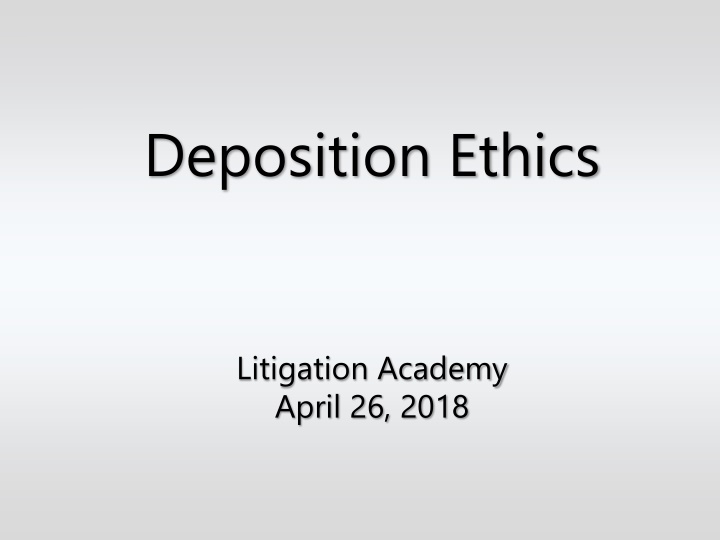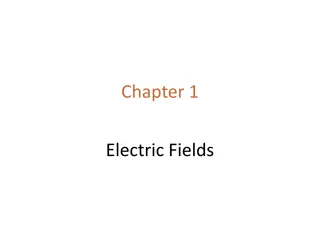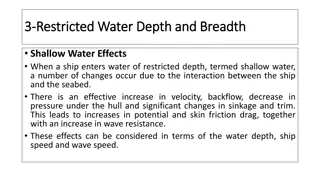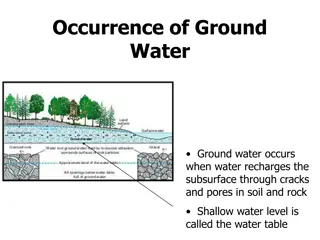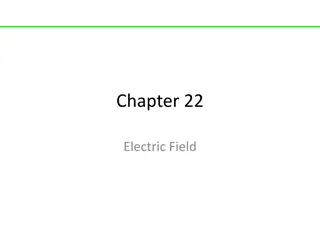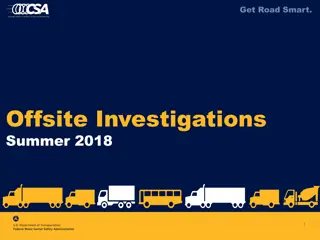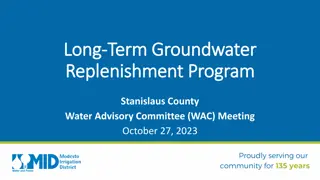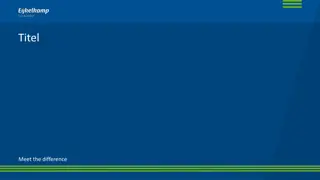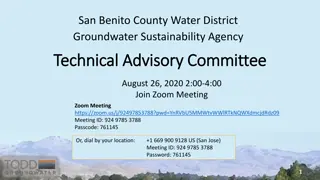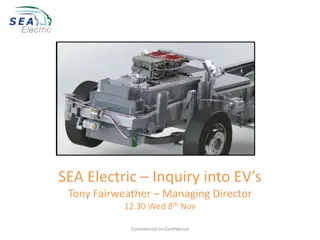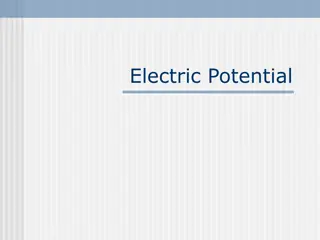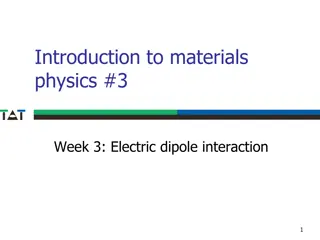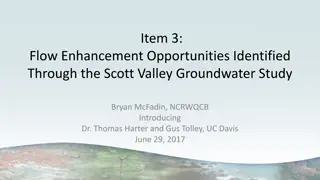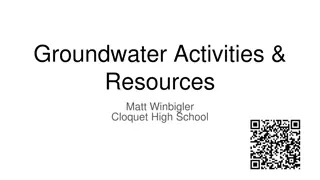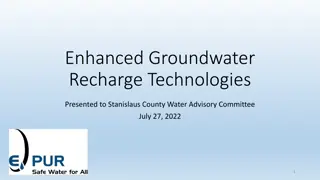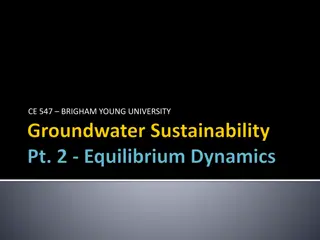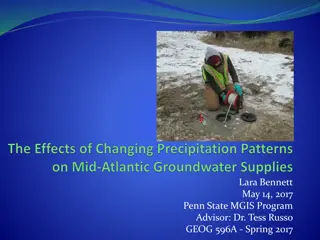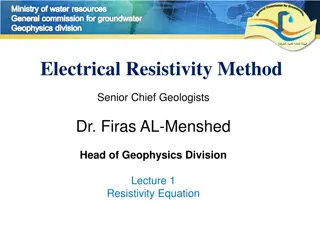Electric Method in Shallow Investigations and Groundwater Studies
Electric method is a crucial technique utilized for shallow investigations, groundwater studies, aquifer analysis, and more. It is employed in engineering projects like detecting sinkholes and subsidence. The method involves the use of natural sources like electromagnetic currents and man-made sources. Understanding resistivity, Ohm's Law, and factors affecting resistivity in soil, such as mineral grains, moisture, salinity, porosity, fracturing, type of soil, moisture content, temperature, grain size, and chemical composition, is essential. Electric conductivity, various electrical arrays like Venner, Schlumberger, and Polar dipole arrays, play significant roles in this method.
Download Presentation

Please find below an Image/Link to download the presentation.
The content on the website is provided AS IS for your information and personal use only. It may not be sold, licensed, or shared on other websites without obtaining consent from the author.If you encounter any issues during the download, it is possible that the publisher has removed the file from their server.
You are allowed to download the files provided on this website for personal or commercial use, subject to the condition that they are used lawfully. All files are the property of their respective owners.
The content on the website is provided AS IS for your information and personal use only. It may not be sold, licensed, or shared on other websites without obtaining consent from the author.
E N D
Presentation Transcript
Deposition Ethics Litigation Academy April 26, 2018
The Dos and Don ts of Being a Potted Plant
Lawyer Brendan Sullivan* defending Oliver North testimony to Congress during Iran-Contra hearings (1987) 'I'm not a potted plant. I'm here as the lawyer, that's my job. *Rhode Island native
Lets start with the Donts. How to defend a deposition in an ethical way.
The Donts depend (in part) on the Court: Fed. R. Civ. P. 30 (c) and (d) Kelvey v. Coughlin
Lets start with: Kelvey v. Coughlin
What to do? You are defending the deposition of your client. The lawyer taking the deposition persists in asking questions that you believe to be intrusive and harassing. At what point can you direct your client not to answer?
Never.* * Except to preserve a privilege.
The only instance, we repeat, the only instance in which an attorney is justified in instructing a deponent not to answer is when the question calls for information that is privileged. Kelvey v. Coughlin, 625 A.2d 775, 776 (R.I. 1993)
Where privilege is at issue, at what point should you direct your client not to answer? Q: Did you meet with your lawyer? Q: Who was present at the meeting? Q: Was the meeting for the purpose of getting legal advice? Q: What did you discuss at the meeting?
Even in cases of a privilege objection, the deponent is permitted to answer questions as to the underlying circumstances . . . . Kelvey v. Coughlin, 625 A.2d 775, 776 (R.I. 1993)
And we mean it! Post-Kelvey Rulings In deposition in bus accident case, plaintiff s lawyer asked bus driver to draw a diagram showing the position of the bus. Defense counsel directed him not to. RI Supreme Court held: Improper. There is no general privilege protecting diagrammatic testimony. Cunningham v. Heard, 667 A.2d 537, 538 (1995)
And we mean it! Post-Kelvey Rulings In deposition in medical malpractice case, defendant doctor was asked to explain the standard of care applicable to his treatment of the plaintiff. Defense counsel directed him not to. RI Supreme Court held: Improper. The motion judge was correct that no privilege existed. Menard v. Blazer, 669 A.2d 1160, 1162 (1996)
And we mean it! Post-Kelvey Rulings In deposition in personal injury case against hotel, staff were asked what facts they told the insurance investigator after the accident. Defense counsel told them not to answer. RI Supreme Court held: Improper. Witnesses in our state courts do not become the exclusive property of whatever litigant first contacts and interviews them. Menard v. Blazer, 669 A.2d 1160, 1162 (1996)
Or maybe not? Post-Kelvey Rulings In deposition in auto accident case, plaintiff s counsel asked mother of injured minor reasons for her divorce and other personal matters. Defense counsel directed her not to answer. RI Supreme Court held: Improper, but we nevertheless conclude that the hearing justice did not err in denying defendants motion to reopen discovery. Menard v. Blazer, 669 A.2d 1160, 1162 (1996)
What to do? You are defending the deposition of your client. Your client is giving deposition answers that are inconsistent with the evidence he produced. How to get your client to look at the documents?
Counsel for the deponent shall refrain from gratuitous comments and directing the deponent in regard to times, dates, documents, testimony, and the like. . . . Kelvey v. Coughlin, 625 A.2d 775, 777 (R.I. 1993)
NOT ALLOWED Gratuitous remarks: If you know . . . Directing the deponent: He s asking you about the 25th, not the 26th. Look at the documents in front of you. I can t imagine how he would know that
Example from Kelvey: (Problematic)
What to do? You are defending the deposition of your client. Opposing counsel has asked a question that you believe materially misstates the evidence. How do you get the misstatement into the deposition record?
Counsel shall refrain from cueing the deponent by objecting in any manner other than stating an objection for the record followed by a word or two describing the legal basis for the objection. Kelvey v. Coughlin, 625 A.2d 775, 777 (R.I. 1993)
ALLOWED Objection, to the form of the question. Objection, compound question. Objection, misstates the facts.
NOT ALLOWED Objection, the question asks her to talk about a meeting she did not attend. Objection, you have misstated the standard of care. Objection, the light was red when the defendant went through the intersection, not green.
What to do? You are defending the deposition of your client. You and opposing counsel get into a serious dispute about his course of conduct during the deposition. Should you memorialize this by putting this discussion on the record?
Counsel shall refrain from dialogue on the record during the course of the deposition. Kelvey v. Coughlin, 625 A.2d 775, 777 (R.I. 1993) (with a few exceptions)
So what can you do if opposing counsel is abusing the witness or otherwise engaging in deposition misconduct?
[C]ounsel may call for suspension of the deposition and then immediately apply to the court in which the case is pending, or the court in which the case will be brought, for an immediate ruling and remedy. . Kelvey v. Coughlin, 625 A.2d 775, 777 (R.I. 1993)
One Option in Egregious Cases: It is hereby ordered that any and all future depositions shall be held in Courtroom 10 or such other room within this courthouse as this Court shall direct so that this Court can more easily monitor any discovery disputes that arise. Coutu v. Tracy, 2004 WL 2821636 (R.I. 2004)
What about federal court? Fed. R. Civ. P. 30 (c) and (d)
Federal Rule of Civil Procedure 30(c)(2) Objections. . . . An objection must be stated concisely in a nonargumentative and nonsuggestive manner. Speaking objections and coaching objections are simply not permitted in depositions in federal cases.
Federal Rule of Civil Procedure 30(c)(2) Objections. . . . A person may instruct a deponent not to answer only when necessary to preserve a privilege, to enforce a limitation ordered by the court, or to present a motion under Rule 30(d)(3).
Federal Rule of Civil Procedure 30(d)(1) Motion to Terminate or Limit. (A) Grounds. At any time during a deposition, the deponent or a party may move to terminate or limit it on the ground that it is being conducted in bad faith or in a manner that unreasonably annoys, embarrasses, or oppresses the deponent or party.
What about the Dos? Don t forget that you really are not a potted plant!
What to do? You are defending the deposition of your client. Opposing counsel repeatedly poses questions that are irrelevant to any issue in the case. What do you need to do to preserve your objection?
Nothing.* * Until later.
Basic Distinction Objections that are preserved whether or not made at the deposition Objections that are waived if not made at the deposition FRCP Rule 32(d)(3)(B) FRCP Rule 32(d)(3)(A)
Federal Rule of Civil Procedure 32(d)(3) (A) Objection to Competence, Relevance, or Materiality. An objection to a deponent's competence--or to the competence, relevance, or materiality of testimony--is not waived by a failure to make the objection before or during the deposition, unless the ground for it might have been corrected at that time.
Federal Rule of Civil Procedure 32(d)(3) (d) Waiver of Objections. . . . (B) Objection to an Error or Irregularity. An objection to an error or irregularity at an oral examination is waived if: (i) it relates to the manner of taking the deposition, the form of a question or answer, the oath or affirmation, a party's conduct, or other matters that might have been corrected at that time; and (ii) it is not timely made during the deposition.
Otherwise stated: Deposition objections ordinarily should be limited to those that under Rule 32(d)(3) might be waived if not made at that time, i.e., objections on grounds that might be immediately obviated, removed, or cured, such as to the form of a question or the responsiveness of any answer. Southgate v. Vermont Mutual Insurance Co., 2007 WL 1813547 (D.R.I. 2007)
Example of Problem: Q: Did you learn about the company s financial problems at the meeting, or was that not until later? A: Yes.
Challenge Problem: What to do? You are defending the deposition of your client. Your client has forgotten some key events and given damaging testimony. Can you raise this with him during a break in the deposition?
Rule No. 1: Know your court. More and more judges are issuing discovery orders that do not allow conferences between the defending lawyer and the witness during the pendency of the deposition, even during breaks and recesses, except when necessary to discuss whether to assert a privilege or when required as a matter of professional responsibility to ensure that the witness is not committing perjury. Some courts accomplish the same end through local rules. The Effective Deposition, p. 333
If there is no such rule, can you use discussions with your client during breaks to: Discuss issues of privilege that have or may arise Remind him or her of deposition protocol (listen to the question, answer only the question asked, etc.) Show him or her documents Discuss his or her deposition answers
Go forth and depose (properly)!
